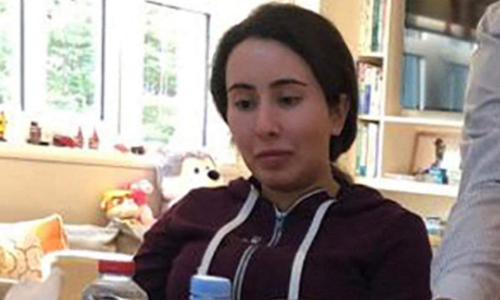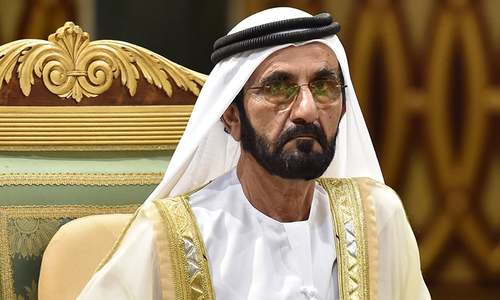THIS has never happened before. A British court has found that the ruler of Dubai, Sheikh Mohammed Bin Rashid Al Maktoum, had arranged for two of his adult daughters to be kidnapped and forcibly returned to the emirate after they attempted to flee abroad. The fact-finding judgement emerged from a case filed by the sheikh’s former wife, Princess Haya, to prevent her husband from taking their children, aged 7 and 11, back to Dubai from where she had escaped with them to London last year. The court also granted protective orders for the children.
Read: The failed escape: Sheikha Latifa's doomed flight from Dubai
During the court proceedings, among the most high-profile in Britain since the divorce of Prince Charles and Princess Diana, the lawyer for Princess Haya argued that the sheikh had used his status to “threaten and intimidate” his former wife. On two occasions she found a loaded gun with the safety catch off on her bed. On another, a helicopter landed at her estate and the men on board tried to kidnap her, threatening to take her to a remote desert prison in Dubai.
The court believed Princess Haya, the half-sister of King Abdullah of Jordan. She and the sheikh married in 2004, after a fervid romance that began at a riding event in Spain. Both loved racing their expensive horses on the circuit all over Europe and the United Kingdom. All seemed well until February last year, when the princess found out that the sheikh had divorced her. The reasons for the divorce are unclear, but whatever they were, the princess took her kids and left and went to London.
Pakistan does not have any royals but many millionaires here operate under the same archaic belief that women are property.
It is not the first time that an Emirati princess has appealed to the British for help. Back in 2000, Princess Shamsa, one of the sheikh’s daughters, attempted an escape after a riding event. (She too was a skilled equestrian.) A huge search was launched and she was eventually tracked down and apprehended by Emirati bodyguards in Cambridge, England. She has not been heard of since. Then in 2018, Shamsa’s sister, Princess Latifa, also attempted a spectacular escape. Pretending to visit a café, the princess, then in her early thirties, fled to the beach, where she used jet skis to get to a boat captained by a man with whom she had been communicating via the internet. The two were able to escape and survived on granola bars while they tried to use the boat’s satellite internet to get the message out to the western press. Near the coast of Goa, their attempts at communication were apprehended by the Indians, who had been forewarned by the Emiratis. When Princess Latifa was taken off the ship, she repeatedly stated she was asking for asylum. The men did not care to listen to what she was saying and she was forcibly returned to Dubai.
What are the reasons so many supposedly blessed royal women are trying to escape Dubai and Sheikh Maktoum? According to a recent article published in Vanity Fair, the life of royal Emirati women is very different from the picture of suave urbanity that the sheikh projects in public. He has had at least six wives and is the father of 30 children. While Dubai sports a veneer of modernity, what with the towering Burj Khalifa and the gleaming malls all a testament to a successful experiment in merchant capitalism, private mores have not changed.
Among these prevalent norms is that royal women will ascribe to strict codes of conduct, ensure that every move is approved by their male guardians, spend their monthly royal stipends and not complain. Those who do are dealt with swiftly, as the examples of princesses Shamsa and Latifa illustrate. Domestic violence, coercion and imprisonment are all rumoured to be taking place and very likely do so. If princesses do not abide by the rules made by their guardians, their lives are likely to be nasty and brutish.
It is a terrible pity. The image that Dubai presents to the world and to the hundreds of thousands of expats that live there is one of a laissez-faire merchant capitalism. Alcohol is easily available, there are no restrictive dress codes for women, technology abounds and money appears to possess the magic of making everything possible. The idea that the ruler of such a place would harass his wives and keep his daughters captive seems, in the glitz and glamour of Dubai’s synchronised fountains, impossible.
This syndrome of projecting the image of being progressive is very familiar to Pakistanis. The country does not have any royals but many wannabe magnates and millionaires here operate under the same archaic beliefs that women are property, available to be married off, traded, held captive and ignored. The captive women of wealthy Pakistan, living out unhappy marriages, bearing abuse in private, are adept at slathering on make-up and covering up their scars with expensive threads.
As it is in the royal lands of the Muslim world, so it is in the plains and trenches like Pakistan. On the surface, the sheikh, who dresses in full British garb for the horse races at Ascot, appears to be a rational and sensible man who would not be given to such atrocities. Yet the measure of his tolerance is so low that a woman who wants to make decisions about her own life is more than he can handle.
With no one to stand up to him, it fell perhaps to a British court to do so. Princess Haya, then, is the one who got away. Not only that, she also managed to get legal protections to keep her children with her. In the end, perhaps, the lessons that the men of the Muslim world are unwilling to learn voluntarily are taught to them by force. So it is for the king of Dubai; so too it may be for the pretend-kings of Pakistan.
The writer is an attorney teaching constitutional law and political philosophy.
Published in Dawn, March 11th, 2020













































